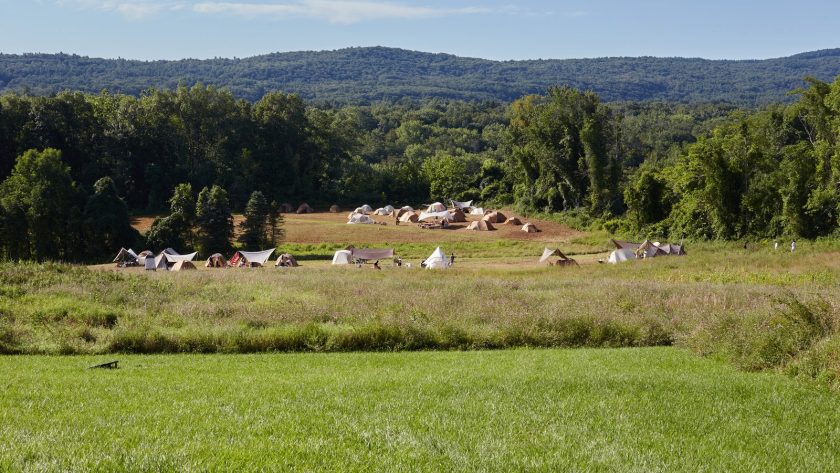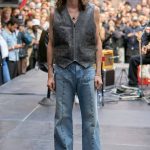There is a well-known “Calvin and Hobbes” comic from August 1987 in which Calvin’s dad takes the family camping. In the beginning, Calvin is excited. Fishing, canoeing, and living in a tent? Sounds awesome! But then the sky opens up and it begins to downpour. Everyone gets soaked. “If we live to get home, I’m never going to set foot outside again as long as I live,” Calvin grumbles.
Last weekend, at Callisto Farm in High Falls, New York, the scene looked somewhat similar. It was one of the hottest weekends during the hottest month in recorded history, with temperatures hovering around 90 degrees, even outside the city. When it didn’t feel like a sauna outside, it was, of course, raining. Yet over 100 people still showed up to participate in Snow Peak Way, a two-and-a-half-day camping experience the outdoors brand began hosting in 1998 in Japan to bring together its staff and some of its most diehard customers. (Seventeen will take place there this year with some 300 guests each, chosen by a lottery system, plus three exclusively for loyal customers.) In 2018, Snow Peak brought the event to the West Coast; the brand’s US flagship is located in Portland, Oregon. And finally, this summer, it hosted its inaugural East Coast equivalent, just in time for a heat wave.
Kana Motojima
Founded in 1958 by avid climber Yukio Yamai in the Niigata prefecture, Snow Peak is adored by serious campers and menswear guys alike. My friends who love the brand are both—they forage, climb, and hike in Arc’teryx shells and Salomon sneakers, placing whatever mushrooms they may find in collapsible Snow Peak baskets and sipping out of Snow Peak water bottles. It’s gear and apparel for people who appreciate the outdoors, design, and the finer things in life—and who believe that you don’t have to sacrifice the latter to enjoy the former.
On Saturday afternoon, Noah Reis, Snow Peak USA’s vice president and chief operating officer, recalled the “Calvin and Hobbes” comic as ominous clouds rolled in. To him, it wasn’t so much a reflection of what was happening at present—although his Snow Peak chair sank slightly into the mud as he spoke—but rather the American attitude toward camping in general. Here, as Calvin himself laments, to suffer outdoors is to (allegedly) build character. If you’re not roughing it, you’re not doing it right. (Or at all, depending on who you ask.) “But at Snow Peak, our style is very much about making it elevated and comfortable,” said Reis. “How do you bring the comforts of home to the campsite, so you can actually enjoy your time outside together?”
Kana Motojima
Kana Motojima
If anything, the weekend put this question to the ultimate test. Despite the objectively uncomfortable weather, I was pleasantly surprised to find neither a single bug nor a drop of water in my borrowed Snow Peak Amenity Dome, and I slept comfortably on a Snow Peak sleeping pad and half inside a sleeping bag Friday night. (If you know me, this is shocking. When my mom dropped me off at sleepaway camp for a week—a week!—I cried so hard I threw up. Until I got the Snow Peak invite, I’d refused to camp with friends.) The weather also didn’t stop campers from tie-dyeing, exploring the area, and grilling yakitori, stoking wet logs with the help of elegant Snow Peak–branded flame blowers.
Most campers came prepared. “The scale of people’s setups here is really on point, compared to what we would typically see on the West Coast,” said Mike Andersen, Snow Peak USA’s brand manager, who, like Reis, is based in Portland. New Yorkers certainly prize their real estate, and as I admired the particularly high ceilings and square footage of a Snow Peak Living Lodge, I was informed that it costs about the equivalent of one month’s rent. Campers, who traveled not just from the city but all over the East Coast, also rolled up with portable stainless steel kitchens that looked nicer than the one in my apartment, futon couches, and coffee-making equipment that rivaled Blue Bottle.



